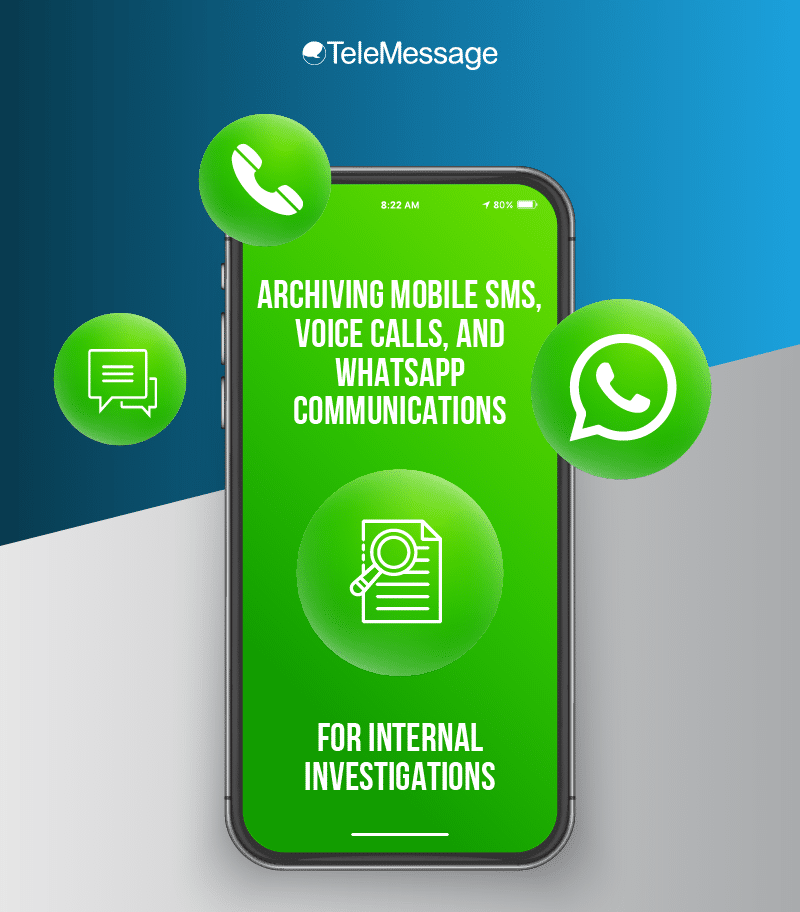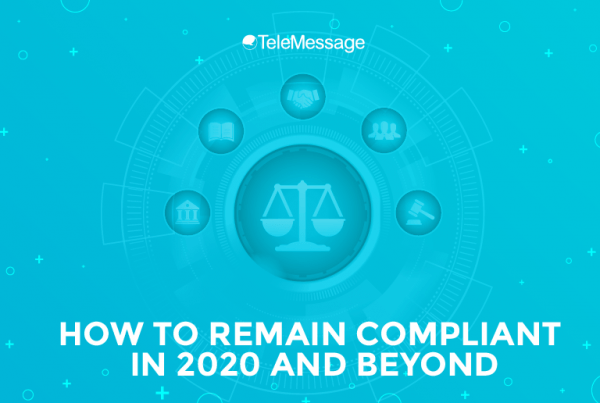Many financial firms worldwide are continuing their operations during the pandemic. While most of these firms have the technological capacity to support their core operations remotely, many are still having difficulties maintaining records of their employees’ communications for compliance purposes.
Organizations had various means to communicate with their clients, including collaboration applications and mobile phones. Due to the fact that many people want to use the solutions that they’re familiar with, most people use their mobile phones to transact business. Organizations need to know how they can retain their messages and use them efficiently for internal investigations.
Many messaging solutions, including the popular WhatsApp, are naturally uncompliant with data protection regulations, and it’s essential to know how to overcome them to ensure that investigations will run smoothly. Organizations using mobile phones must know how to archive text messages and voice calls to comply with data protection regulations.
The company must have excellent eDiscovery capabilities to have smooth internal investigations as well as respond to audits on time. Investigators need more than guesswork, hunches, and general impressions to develop a clear picture of an incident. It’s vital to know how to gather the facts from a company’s myriad of communication records.

Challenges on eDiscovery
Investigators can only get the real story behind an incident only when they have the relevant facts. They must first determine where they can find such facts since there are likely multiple conversations recorded in the company’s servers.
Many employees in the financial industry currently use mobile messaging apps to communicate with their clients to leverage the applications’ convenience. Compliant companies have likely accumulated a large number of electronic records. While having the records themselves ensures that they are compliant with various regulations, including FINRA retention requirements, investigators can still have problems retrieving the relevant data.
JPMorgan banned their employees from using WhatsApp because it isn’t compliant with GDPR and other regulations. Without adequate WhatsApp archiving capabilities, the chances of some staff members committing fraud unchecked are high. Once such messages are retained and monitored, investigators can then look for the relevant communications data when needed, even after the user deleted their WhatsApp. The only problem is how they can do it.
Identify Relevant Data Using Subject Names, Dates, And Keywords for eDiscovery
When accessing the archived communications, internal investigators can use subject names, dates, and specific keywords to look for the relevant data. Using such means, investigators can narrow down their search and have an easier time finding the conversation related to an investigation.
Searching records using the sender or recipient’s name will produce the messages and calls made by that particular person. Investigators must then sort through them until the relevant messages are found.
Searching by date narrows down the field by looking for communications held on a particular day. Looking for messages by date is disadvantageous if there happened to be more messages from different days. Investigators can have a hard time to capture the messages’ context.
Context is also hard to get when searching via keywords. Searching via keywords is also tricky because the investors rely on trial and error to produce results.
If the organization only relies on emails, then the eDiscovery phase is more challenging to accomplish because the conversations are unstructured. Using mobile phone messaging applications along with a robust archiver that can record voice calls and text messages is much more advantageous than relying on other means of electronic communication, especially when the company conducts an internal investigation.
Store Captured Data Externally
Relying on the cloud to store data is a trend among many businesses worldwide thanks to its many advantages. People can access their files from anywhere, and it also allows employees to work remotely. Storing the captured communications data to external servers instead of in-house ones will enable investigators to access the company’s archived communications data even amidst the pandemic.
Because many bankers and traders now conduct their business using their mobile phones and applications, it’s essential to record SMS messages. Monitoring messages is critical to ensure that none of an organization’s employees will commit any fraudulent activities.
Maintain Records at a Set Schedule
When capturing data, it’s advantageous to follow a set schedule on how long one will retain communications data. Compliant regulated organizations will likely maintain data for as long as the regulations say so. Different companies and agencies, may it be from the financial industry or the government sector, have varied data retention periods ranging from two years to seven years from the date of creation.
Retaining messages longer than required may be advantageous should investigators need to look for any evidence beyond the required data retention period. Still, the large amount of accumulated data can also complicate eDiscovery. When investigators search messages by the sender’s name, they’ll have problems when they have to dig through years of communications to see if a particular employee committed any crimes.
Outdated data that are no longer needed even for regulatory purposes must be deleted to ensure that the discovery phase for such data is streamlined.
Ensure that the Archives Allow for Supervisory Review
Having call monitoring and SMS capturing solutions that can’t be used for supervisory review won’t be of any use when investigators and supervisors can’t use them. It’s vital to be able to readily review the content in their natural and original format to ensure that investigators can use them.
Internal investigations can only be successful when the archived mobile SMS, voice calls, and WhatsApp communications are accessible. If the relevant people can’t access the records, then organizations in regulated industries may be deemed uncompliant since they can’t provide the necessary data.
TeleMessage captures and records mobile content, including SMS, MMS, voice calls, social media, and WhatsApp Chats from corporate or BYOD mobile phones. Messages are securely and reliably retained either within TeleMessage servers or forwarded to an archiving data storage vendor of the company’s choice.
Our mobile archiving products securely record content from mobile carriers and mobile devices for various ownership models (BYOD, CYOD, and employer-issued). With our multiple archiving solutions, you can always find the right tools or blend for your requirements:
TeleMessage offers cross-carrier and international mobile text & calls archiving for corporate and BYOD phones. Contact us to learn more about how our mobile archiving products can help your company or agency record mobile messages for a timely response to eDiscovery requests.





